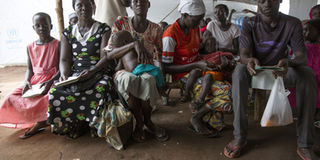Audit entire refugee operations

With the district local government and hospitals in place, one wonders where the big numbers came from if the figures were harmonised for planning. FILE PHOTO
What you need to know:
- The officials decried the lack of funding from the international community to support refugee operations in Uganda yet asylum seekers continue to pour in on a daily basis from South Sudan and DRC.
- With the district local government and hospitals in place, one wonders where the big numbers came from if the figures were harmonised for planning.
Following a series of media reports about the refugee scandal that has rocked OPM, UNHCR and WFP in managing provision of services to refugees, I have been compelled to as a private citizen. This basing on the global applauds Uganda has had for having the most generous refugee regime as compared to other countries.
What perhaps should be known is that it was only a matter of time and some of the concerns would be blown. In December 2017, my class and I visited Adjumani District to interact with refugees and officials from OPM, UNHCR and other non- governmental organisations implementing various refugees programmes. In each of the meetings, the officials decried the lack of funding from the international community to support refugee operations in Uganda yet asylum seekers continue to pour in on a daily basis from South Sudan and DRC.
The questions was, “how is the registration of refugees done and how were the funds raised from the Solidarity Summit in June last year supposed to support the operations? The response was that OPM registration systems for refugees under the Refugee Information Management System is used alongside UNHCR’s ProGRES to improve the collection, sharing and use of information on refugees and other persons of concern. Besides, we were also informed that refugee children born in refugee hosting districts in Uganda had their birth registered through technical support from National Identification and Registration Authority (NIRA),
With the district local government and hospitals in place, one wonders where the big numbers came from if the figures were harmonised for planning. Secondly, the officials informed us that not every country that pledged during the summit have fulfilled their commitment. That the funds were coming in at a slow pace and also that funds from the Compreheinsive Refugee Response Framework (CRRF) is not being channelled through government, but through international humanitarian agencies.
They said this was leaving a huge gap in funding provision of services to refugees to an extent that WFP had to reduce food rations to refugees. Much as I appreciate the fact that asylum seekers from South Sudan and DRC continue to flock to Uganda, the institutions charged with this enormous responsibility ought to plan jointly so as to know how what is required. Unless this “gap” is closed, unexplained leakages of funds will continue. So what can OPM, UNHCR and WFP do to redeem the situation? Suspending suspected errant officials or cleaning up the refugee registration system, or UN and government creating an independent account for all funds for refugee operations and manage it jointly rather than leave it to the OPM is the way to go.




